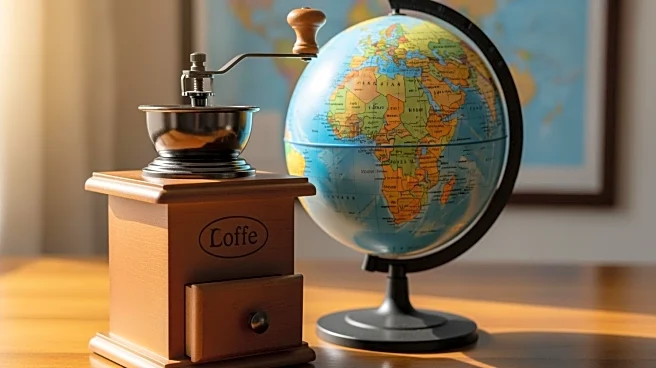What's Happening?
The Trump administration's tariffs on coffee imports are causing significant price increases for coffee roasters and consumers in the U.S. Retail coffee prices rose by nearly 21% in August compared to
the previous year, with tariffs on major coffee-exporting countries like Brazil, Vietnam, and Colombia contributing to the hike. Brazil faces a 50% tariff, while Vietnam and Colombia have 20% and 10% tariffs, respectively. These tariffs are affecting local coffee shops, with prices for a regular hot coffee in Washington, DC, averaging $4.21, up 4% from last year. Roasters are absorbing some of the costs, but consumers are ultimately paying more for their coffee.
Why It's Important?
The tariffs on coffee imports have broader implications for the U.S. coffee industry and consumers. As coffee prices rise, consumers may alter their purchasing habits, potentially impacting local coffee shops and roasters. The increased costs also place pressure on small and medium-sized businesses, which may struggle to maintain profitability. The bipartisan 'No Coffee Tax Act' introduced by Rep. Don Bacon and Rep. Ro Khanna aims to exempt coffee products from tariffs, highlighting the political response to consumer and industry concerns. The situation underscores the interconnectedness of global trade policies and local economic conditions.
What's Next?
The introduction of the 'No Coffee Tax Act' suggests potential legislative action to alleviate the impact of tariffs on coffee prices. If passed, the act could provide relief to coffee roasters and consumers by exempting coffee products from tariffs. Meanwhile, coffee businesses may explore alternative sourcing strategies to mitigate costs, such as diversifying their import origins. The ongoing trade tensions and environmental factors affecting coffee production may continue to influence prices and industry dynamics, prompting further advocacy and policy discussions.
Beyond the Headlines
The tariffs on coffee imports raise questions about the broader implications of trade policies on consumer goods and small businesses. The situation highlights the challenges faced by industries reliant on imported goods and the potential for political intervention to address economic impacts. Additionally, the cultural significance of coffee as an 'affordable luxury' may influence consumer behavior and industry strategies, as businesses seek to balance cost increases with maintaining customer loyalty.









